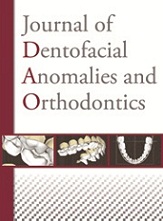No CrossRef data available.
Article contents
Some comments on surgery of nasal septum and turbinates in children
Published online by Cambridge University Press: 23 February 2011
Abstract
Every day orthodontists observe the consequences habitual mouth breathing has in their patients’ oral cavities and the limitations this dysfunction places on their orthopedic and orthodontic treatments. Orthodontists can enlist the assistance of their ENT colleagues for the elimination of hypertrophied adenoidal and tonsillar tissue, but when asked to perform surgical correction of malformed nasal septa and turbinates for young children most otolaryngologists usually advise strongly against such procedures. Even surgery for labio-maxillo-palatal clefts is still entangled in the same web of dogmatic disapproval. For these unilateral or bilateral cleft patients, 75 % of whom breathe primarily through their mouths, the potential for growth is considered to be limited and unpredictable. This belief, we feel, is related to the tendency of workers in our field to pay insufficient attention to nasal breathing. But in our practice, for the past thirty years we have been re-establishing it for patients at about the age of 6 and now we are doing it for children between the ages of 4 and 5. For the last 13 years we have helped affected children to breathe nasally at the age of 6 months by means of an ambitious but rigorous surgical procedure on all patients with total clefts. The current results on the nasal and maxillary growth of these children are good enough to encourage us to continue along the same lines, with the expectation of very soon being able to confirm our results as they reach the end of their growth periods.
- Type
- Research Article
- Information
- Journal of Dentofacial Anomalies and Orthodontics , Volume 13 , Issue 3: Hyperdivergence , September 2010 , pp. 273 - 286
- Copyright
- © RODF / EDP Sciences




